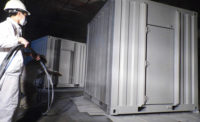Fastener Manufacturers Improve ‘Drivability’ with Unique Coatings

Since cordless tool battery life is a serious concern for pros and DIYs, a growing number of fastener manufacturers are addressing the issue with unique coatings that dramatically increase the “drivability” of nails and screws.
This, in turn, minimizes the amount of power used by cordless tools, extends the battery life and increases productivity since fasteners can be fixed faster and in higher volume before the battery must be changed out or recharged.
Drivability can also impact gas-actuated fastening systems that utilize fuel cells, coupled with batteries, to drive framing nails, finishing brads or screws without having to connect to an air compressor or power cord.
The fuel cells, which can cost as much as $15 at big box stores depending on the brand, are typically advertised as being able to driving 1,200 nails. By improving drivability of framing nails, a more economical and efficient 2,000 nails could be achieved per fuel cell, for example.
According to Dan Chin, President of Universal Chemicals & Coatings (Unichem), this was the specific goal of one fastener manufacturer that sought his company’s help in creating a specialty coating that would dramatically improve the drivability of nails.
Unichem is a custom coating and adhesives formulator that has worked with fastener manufacturers on these types of issues.
The manufacturer’s goal, says Chin, was to be able to market the gas-actuated framing nail gun’s ability to drive a higher number of nails per fuel cell to differentiate it from the competition.
“The goal was to improve what the company called ‘ease of drive’ by 25%, which is a huge number,” says Chin. “In doing so, more framing nails could be driven flush with one fuel cell.”
To shoot a nail, fuel cell-powered nail guns inject a small amount of fuel along with compressed air into a chamber. A battery-supplied spark then causes a tiny explosion, which drives home the nail.
Manufacturers of cordless framing and finishing guns often market unit-specific nails or screws. These consumables generate significant ongoing revenue. Given the competition in the space, offering a product with a promotable differentiator is even more critical.
The challenge facing Unichem was to create a custom coating for the nails that improved drivability without allowing it to be easily removed.
“You can create a coating that increases the lubricity or ‘slipperiness’ of the nail so it goes in easily, but then it must act like an adhesive once in so it cannot be easily taken out,” says Chin.
Unichem’s chemists successfully figured out a coating formulation that improved nail drivability by 25%, while meeting required anti-withdrawal properties.
“The specialty coating allowed the customer to re-launch the product and market it as incorporating new, improved technology,” explains Chin. “They were able to increase their revenue and were very successful with it.”
The coating also potentially increases the number of nails that could be driven on a single, full battery charge, a high priority for cordless tool manufacturers and users.
Whether a pro wields a framing nailer at a construction site or a DIYer uses a finish nailer to install moldings or baseboard, no one wants to interrupt the job to change out, or recharge, a dead battery. The same is true for anyone using a cordless screwdriver, drill driver, or impact driver.
To address this issue, various strategies have been employed to extend battery life. Some include moving to more powerful, longer-lasting lithium batteries along with techniques to avoid overcharging.
Instead, Chin suggests forward thinking fastener manufacturers consider custom coatings that help to speed jobs and maximize cordless power tool life in the field.
“In a competitive market like fasteners, coatings can be used to create innovative new products with a clear-cut differentiation from the competition,” says Chin.
For more information, visit online at www.unicheminc.com.
By Universal Chemicals & Coatings (Unichem)
Looking for a reprint of this article?
From high-res PDFs to custom plaques, order your copy today!







